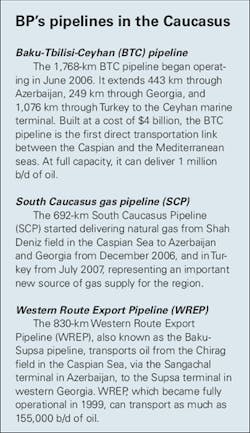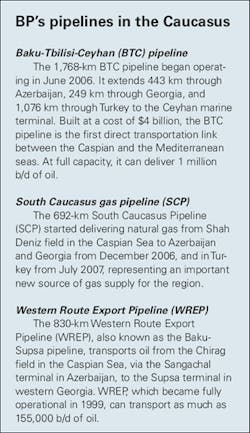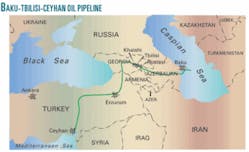BP PLC is dealing with the aftermath of the conflict in the Caucasus region after the Russian government sent troops and bombarded locations in Georgia on Aug. 8.
The Russian incursion came after Georgia earlier launched a major military offensive to retake the breakaway province of South Ossetia, threatening to ignite a broader conflict.
Hundreds of civilians were reported dead, while witnesses said the South Ossetian capital of Tskhinvali was devastated. It has been described as the worst outbreak of hostilities since the province won defacto independence in a war against Georgia that ended in 1992.
For BP, the sudden conflict immediately threatened its efforts to use alternate routes and modes of transport to move crude oil from the region in the wake of the earlier shutdown of the 850,000-b/d Baku-Tbilisi-Ceyhan (BTC) oil pipeline. The BTC line has been out of action following a recent explosion and fire that occurred in the line’s Turkish sector. In a statement dated Aug. 6 and posted on its web site, the People’s Defense Force (the armed branch of the Kurdistan Workers’ Party) said it had blown up the BTC line (OGJ Online, Aug. 7, 2008).
On Aug. 9, the Georgian government said, “Russia air forces attacked the BTC pipeline and Baku-Tbilisi-Erzirum pipeline lying parallel to it—the two main energy projects of the country.” The government report claimed that “28 out of 30 bombs exploded, with some of them in the direct proximity to the pipeline, just 5 m away.”
Russian officials, who denied the reports, said they had no intention of targeting the pipelines but held open the possibility of accidents interfering with the lines’ operations.
“The Russian Defense Ministry has no plans to bomb the pipeline in Georgia,” said deputy chief of Russian armed forces general staff Anatoli Nogovitsin at an Aug. 11 press conference. However, he voiced “deep concern” over the possibility of “ecological catastrophe.”
BP has consistently said the firm had no knowledge of any bombings on or near its pipelines. But BP reportedly confirmed knowledge of the incident reported by the Georgian energy ministry, while repeating that the pipeline is not damaged.
Hostilities in Georgia have now largely shut down an oil and gas route, initially designed to bypass Russia, estimated to carry as much as 1.6 million boe/d. In early August, exports of Azeri, Kazakh, and Turkmen oil and products from and through Azerbaijan stood at around 1.3 million b/d before falling to 350,000 b/d during the week ended Aug. 8.
Uncertain future
Additional transportation routes were affected by the conflict. On Aug. 13, BP declared a force majeure on liftings of oil from the 150,000-b/d Western Route Export Pipeline (WREP), while supplies of natural gas through the South Caucasus Pipeline (SCP) can continue to flow into Turkey for about another week.
BP closed the WREP and SCP systems on Aug. 12 after Georgian officials issued reports of Russian air attacks on or near the lines. On its web site, the Georgian energy ministry said that WREP “was repeatedly bombed by Russian military forces (near the capital Tblisi).” It said, “This time rocket bombs have been used.”
Closure of the three pipelines—the main showcase of BP activity in the Caucasus—underlines the uncertain future faced by the company in the region as well as by the region itself as an alternative energy corridor to the routes dominated by Russia.
Robert Johnston, director of energy and natural resources at consultancy Eurasia Group, said during an Aug. 11 conference call that the Russia-Georgia conflict will help Russia maintain “a stranglehold” on Central Asian exports of oil and gas.
“Georgia’s reputation as a safe alternate route for pipelines bringing oil and gas from (Central Asia) into the Mediterranean has been compromised,” he said. “If you take the Georgian option off the table...it plays into Russian hands because most of the other viable options go through Russian territory.”
That point was partially confirmed as BP, faced with the shutdown of its three main lines across Georgia, had to turn to alternative routes.
While one route consists of rail transport across Georgia to the port of Batumi, the other remaining route for BP’s Azerbaijan crude goes from Azerbaijan via Chechnya to the Russian Black Sea port of Novorossiisk.
The need to utilize the Russian route represents a reversal of policy—if not an outright failure of that policy—particularly for countries such as Azerbaijan and Kazakhstan long concerned about using or routing pipelines through Russia which gives Moscow control over their oil and gas flows.
According to analyst Global Insight, events of the past week will undoubtedly prompt Azerbaijan and Kazakhstan “to consider diversifying their supply routes more significantly, as it has highlighted the risks both countries face in transporting their oil to international markets.”
Meanwhile, BP said it could take a week to judge how long the BTC line will remain closed after the recent explosion and fire. It said that Turkish pipeline operator Botas has started assessing the damage, with a view to assessing its cause.


